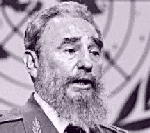FRtR > Outlines > American History (1990) > Chapter Eight > Castro comes to power in Cuba (11/22)
An Outline of American History (1990)
Chapter Eight
Castro comes to power in Cuba (11/22)
< Previous Page * Next Page >
Meanwhile, a political drama was unfolding on the island of
Cuba, 150 kilometers off the United States' southeastern
shoreline. Early in 1959, after fighting for several years,
 Fidel
Castro
overthrew the government of Cuban dictator
Fulgencio Batista.
Mindful of Batista's record of repression, the U.S. government
and the American public in general welcomed Castro's rise to
power, although the United States had given the Batista
government military aid.
Fidel
Castro
overthrew the government of Cuban dictator
Fulgencio Batista.
Mindful of Batista's record of repression, the U.S. government
and the American public in general welcomed Castro's rise to
power, although the United States had given the Batista
government military aid.
American sympathy evaporated, however, when Castro
failed to hold free elections, placed the press under strict
censorship, and sentenced to death a number of his political enemies.
Once again Cuba's jails were filled with political critics, including
many of Castro's former comrades, anti-communist labor
leaders, and other veteran opponents of the Batista regime.
Foreign-owned property was expropriated, in many cases without compensation.
Castro began increasingly to denounce the United States
and to seek support from the Communist-bloc nations. The
Eisenhower Administration at
first adopted a policy of
forbearance but during the summer of 1960 American policy stiffened.
The United States placed a temporary embargo on the purchase
of Cuban sugar and urged the 21-nation
OAS to condemn
Cuba's
actions. The OAS, while it did not directly indict the Castro
regime on this occasion, did condemn Soviet interference in the
western hemisphere because of its support of Castro.
Another international gathering, held later in 1960, seemed
to sum up both the hopeful and the disturbing aspects of the
world scene. Meeting in New York, the U.N. General Assembly
admitted 17 new nations, all but one from the African continent
-a reflection of the rapid postwar movement of formerly
colonial peoples to full independence and nationhood. Speaking to
the U.N. delegates, President Eisenhower asked other nations
to join the United States in providing increased aid to
developing areas generally and to the new African nations in particular.
He also pledged that the United States would continue to seek
world disarmament based on effective inspection and control.
Prior to the General Assembly session, world concern over
the mounting arms race had been heightened by man's conquest
of space, a development that in more tranquil times would have
been a source only of admiration and pride. The launching of
the first Soviet space satellite in October 1957 and the first
American satellite in January 1958 demonstrated that both countries
now had rockets powerful enough to hurl atomic and hydrogen
bombs into the heart of any enemy country thousands of kilometers away.
By the late 1950s technology made possible a push-button
war that could destroy tens of millions of lives within minutes.
The need for a foolproof arms inspection system to prevent the
outbreak of such a war, accidentally or otherwise, seemed obvious
to most of the world. Premier
Khrushchev,
however, told the
U.N. General Assembly that the Soviet Union could not accept
inspection and control in the initial stages of a disarmament
agreement. Disarmament without inspection, the democratic
nations believed, was unacceptable on the grounds that a "closed"
society such as the Soviet Union could violate its disarmament
pledges with little chance of detection, whereas violations within
more "open" societies would have a high chance of being
discovered and publicized.
< Previous Page * Next Page >
 Fidel
Castro
overthrew the government of Cuban dictator
Fulgencio Batista.
Mindful of Batista's record of repression, the U.S. government
and the American public in general welcomed Castro's rise to
power, although the United States had given the Batista
government military aid.
Fidel
Castro
overthrew the government of Cuban dictator
Fulgencio Batista.
Mindful of Batista's record of repression, the U.S. government
and the American public in general welcomed Castro's rise to
power, although the United States had given the Batista
government military aid.